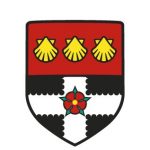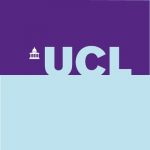Meet your team
Opening up about our project team. Expanded profiles will be available through our weekly blogs.
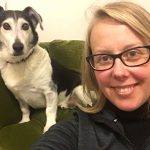 |
Hilary Geoghegan (@DrHG) is an enthusiastic human geographer at the University of Reading. OPENER role: Project leader (PI) and co-developing the national vision. Background: Hilary specialises in the idea of enthusiasm, specifically what motivates people to participate with the material world around them. She has worked with members of the public, volunteers, collectors, hoarders, tinkerers, hobbyists, citizen scientists, policy and evidence teams, museum curators, nature conservationists, plant pathologists, biosecurity officers, and parish councillors. For Hilary, enthusiasm is not only the subject of her research but an integral part of her collaborative and interdisciplinary approach. Picture: Hilary is pictured here with Ben – her canine companion – he is helping her re-think her connection with the natural world. |
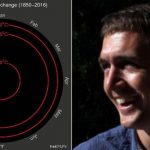 |
Ed Hawkins (@Ed_Hawkins) is a climate scientist in the National Centre for Atmospheric Science (NCAS) at the University of Reading. OPENER role: Leader of the Reading local community of practice and translating social science work into science-speak.Background: Ed works to understand past changes in climate and examine predictions for the future. His research activities also include rescuing historical climate observations with citizen scientists and examining how extreme weather is changing . Picture: Ed is pictured with one of his graphics showing the change of global temperatures that was used during the opening ceremony of the Rio Olympics. |
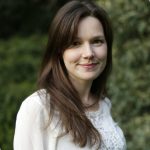 |
Poppy Lakeman Fraser (@) is an ecologist and citizen science specialistfor the Open Air Laboratories (OPAL) initiative, at the Centre for Environmental Policy, Imperial College London. OPENER role: Lead reviewer of existing citizen science and public engagement assets. Background: Poppy has a breadth of experience in biology and citizen science, with interests in the impacts of climate change on land-use and species interactions, as well as urban invertebrates. She is a recognised expert on citizen science in UK and Europe. Picture: Poppy is pictured here as part of her management team role as Senior Programme Coordinator for OPAL – this sometimes requires wellies! |
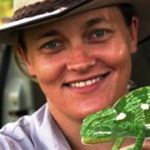 |
Gitte Kragh (@GitteKragh) is a cross-disciplinary ecologist and at Earthwatch Institute (Europe). OPENER role: Co-leader for developing citizen science training Background: Gitte has research experience from rainforests to reefs. Her passion for the environment subsequently led to a PhD on environmental volunteering with a particular focus on volunteer motivation and well-being in relation to the conservation outcomes of environmental projects. She now leads the development of new impactful and engaging European citizen science projects across a range of disciplines. Picture: Gitte with the most vividly green creature we’ve ever seen! |
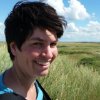 |
Toos van Noordwijk is Director of Engagement and Science at Earthwatch Institute (Europe). OPENER role: Co-leader on recording and evaluating the effectiveness of OPENER as a project. Background: Toos combines more than 10 years experience in conservation ecology researcher with a passion for active engagement with a wide range of audiences. She leads a team of passionate scientists and engagement specialists who engage people from all walks of life in hands-on science. Earthwatch has been active in the field of Citizen Science since 1971 and its work has led to new scientific discoveries and evidence, improvement of conservation policy and management plans and increased personal awareness, understanding and motivation to contribute to a sustainable planet among participants. Picture: Toos in the landscape. |
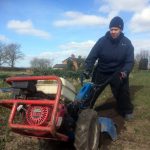 |
Erinma Ochu (@erinmaochu) is an interdisciplinary daydreamer, civic innovator and storyteller in The School of Environment and Life Sciences at The University of Salford. OPENER role: Leader of the Salford local community of practice and capturing on the ground perspectives and experiences of citizen science and engagement. Background: Erinma is interested in exploring how citizens might collaborate to creatively address climate change, social isolation and food security where they live. Trained originally as a neuroscientist, Erinma has worked in science TV and Film, before working as a creative consultant on primary, secondary and higher education social change initiatives. Picture: Erinma was volunteering with a trainee farmer 🙂 doing the alan irwin – help farmers thing during wellcome fellowship, which led to running a farming hackathon: https://vimeo.com/149761716 |
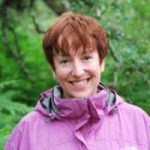 |
Jane Delany (@CapturingRCoast) is a marine ecologist and Director of the Dove Marine Laboratory at Newcastle University. OPENER role: Co-leader of the creation of a national vision and the Newcastle local community of practice. Background: Jane’s interests lie in intertidal community dynamics, coastal plankton assemblages and their responses to climate change. Jane has developed a thriving public engagement and outreach team, which engages in excess of 3000 young learners annually in STEM subjects and with the natural environment, and leads on the Capturing our Coast programme – an interdisciplinary research project that explores the degree to which members of the public can contribute meaningfully to the collation of impactful data underpinning scientific, conservation or policy relevant marine evidence gaps. Picture: Jane proving that marine ecologists are also to be found in non-watery landscapes. |
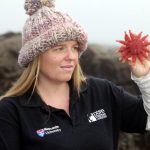 |
Heather Sugden (@CapturingRCoast) is marine biologist at the School ofNatural and Environmental Sciences, Newcastle University. OPENER role: Leads on the Newcastle local community of practice and co-developing the national vision. Background: Heather works in marine benthic ecosystems (very deep in the ocean!) assessing stress responses to abiotic environmental factors. She researches the response of marine communities, specifically benthic invertebrates to climate change, ocean acidification and multiple stressors with particular emphasis on biogeography, macroecology and species distribution patterns. Marine citizen science projects, involving local communities in the surveying of intertidal marine habitats and is CO-I on the national citizen science project ‘Capturing our Coast’. Picture: Heather with a common sunstar starfish and sporting a delightful bobble hat. |
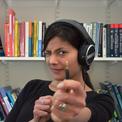 |
Cindy Regalado (@UCL_ExCiteS) is a community organiser, knowledge transfer expert and evaluation researcher at the Extreme Citizen Science research Group (ExCiteS) at University College London. OPENER role: Co-leader on recording and evaluating the effectiveness of OPENER as a project. Background: Cindy’s research focuses on developing frameworks and considerations for factors hindering hindering and promoting public engagement with science and technology at the individual, organisational, and social levels. She has worked in the UK, Canada, Mexico and the Caribbean leading government and research projects of urban planning, community led adaptive strategies for rapid socioeconomic change. Cindy’s work converges with the goal of creating spaces as opportunities (communicatively, physically, emotionally, intellectually, digitally) that incite reflection, exploration, and challenging ourselves and our relationships with the world around us. Picture: Cindy works with playfulness as an inviting, attentive, and disarming attitude that facilitates the introduction of new concepts/ideas, breaking down barriers to full participation. |
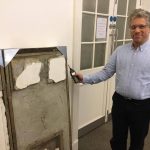 |
Muki Haklay (@mhaklay) is one of the world-leading experts in citizen science, and co-director of the ‘extreme citizen science’ group at University College London (UCL). OPENER role: Co-leader for developing citizen science training and the London local community of Practice. Background: Muki’s interests in citizen science stems from a background in Geographic Information Science and co- developed the approach of extreme citizen science – using citizen science as a vehicle for opening up access to environmental information and scientific methods. He has collaborated with many external environmental organisations, including The Conservation Volunteers, Zoological Society of London, and has received funding on this topic from the EPSRC, ESRC, ERC Advanced Grant, ESRC, EU FP7 and EU Horizon 2020, totalling in over £10 million. He is an experienced mentor for Early Career Researchers, having supervised over 30 PhD students since 2003. Picture: Muki with the work of Leni Dothan, called the citizen cyberscience nightmare wall commissioned as part of the Citizen Cyberscience Summit. |
Institutional Partners (logos taken from Twitter)…
